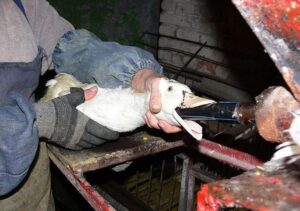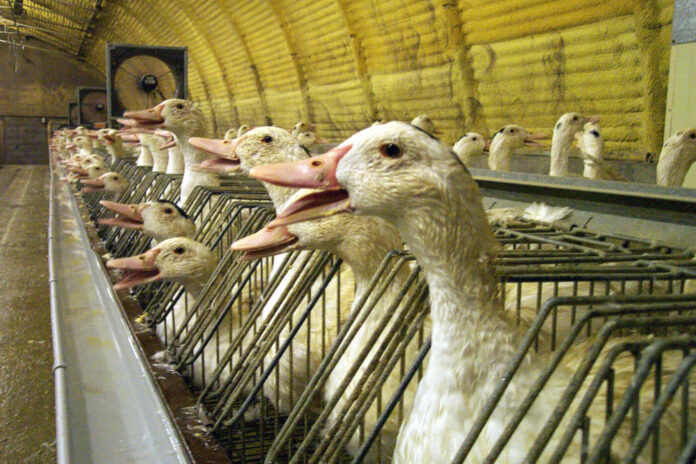Sydney Smith, the 18th century English writer, once wrote, “My idea of heaven is eating pates de foie gras to the sound of trumpets.”
The idea of Foie Gras in the words of Smith sounds rather tempting but the reality is nothing less than horrifying. Foie Gras, a French ‘delicacy’ made using duck or goose liver, dates back to as early as 2500 BC when ancient Egyptians first started making this dish. Unlike other preparations that are made using liver, this involves the barbaric process of force-feeding the birds for a number of days in order to fatten their livers before finally slaughtering them. This forceful feeding makes the birds eat much more food than they would eat voluntarily, and deposits large amounts of fat in the liver in order to produce the fatty consistency that foie gras requires.
Cruel Indulgence
Foie Gras is one of the most expensive dishes in the world with France being the largest producer and consumer. It is also consumed in some other European countries, as well as in the US and China. In European factory farms, the process of force-feeding birds is done using a gavage-based system that involves pushing in food through a tube leading down the throat to the bird’s stomach. This process is a highly controversial one as it leads to enlarging of the liver to 10 times its usual volume, making it difficult for the bird to walk, while also scarring its oesophagus and causing a lot of stress, leading to an early death.
Besides force feeding, there are other animal welfare concerns, especially due to the factory farming system. The birds are kept in tiny cages with no space to move around, which leads to fungal infections, diarrhoea, heat stress, and foot problems. According to PETA, “unable to bathe or groom themselves, these birds become coated with excrement mixed with the oils that would normally protect their feathers from water.” During the force-feeding phase, the ducks are segregated in individual cages, which makes them depressed as they are by nature, social animals.



Foie gras production has another dark side to it. Since foie gras is made using livers of only male ducks, the female ducklings are considered useless and are thrown alive into grinders to be processed as an ingredient in fertilisers and pet food industry.
Ban on Foie Gras
Due to its inherent nature of animal cruelty, the foie gras industry has been constantly facing the ire of animal rights activists. A report by EU committee said there was “sufficient evidence to conclude that force-feeding, as currently practised, is detrimental to the welfare of the birds”. Several animal rights organisations such as PETA, Mercy for Animals, and the Humane Society of the United States also say that foie gras production methods constitute cruel and inhumane treatment of animals. In November 2013, a report in Daily Mirror highlighted cruelty towards ducks in a farm owned by French firm Ernest Soulard – a key supplier to celebrity chef Gordon Ramsay’s restaurants.
Foie Gras has also been targeted by several health experts, who say that the stress created on birds’ livers by force feeding leads to the formation of lumps called amyloids, and by consuming meat of such birds, humans can also develop the same condition. It can also lead to diseases such as Alzheimer’s, type 2 diabetes, rheumatoid arthritis, Huntingdon’s disease, and atherosclerosis caused due to formation of amyloids.
Thankfully, several countries have already banned the production, consumption and import of foie gras due to ethical or health reasons. India became the first country in the world to ban the import of Foie Gras in 2014 following agitation by animal rights group Animal Equality. The production of foie gras is prohibited in countries such as Australia, Argentina, Austria, Germany, Finland, Italy, and Turkey, amongst others. Today, only five European countries still produce foie gras, including Belgium, Bulgaria, France, Hungary and Spain. French law states that “Foie gras belongs to the protected cultural and gastronomical heritage of France.”
The UK is the latest country to have strengthened its stand against this cruel dish. The attack comes from a cross-party group of MPs who have written to ministers urging them to ban sales of foie gras in the country. Though farmers in Britain have been forbidden from producing foie gras since 2006, imports of the product continue. A ban on imports was not possible under EU rules, but the decision can be made post-Brexit.
The way things are moving, it seems plausible that the world will soon witness an end of foie gras. We just hope it happens soon!


